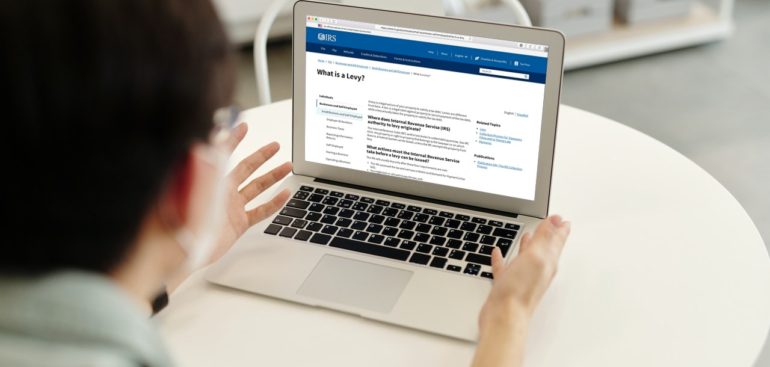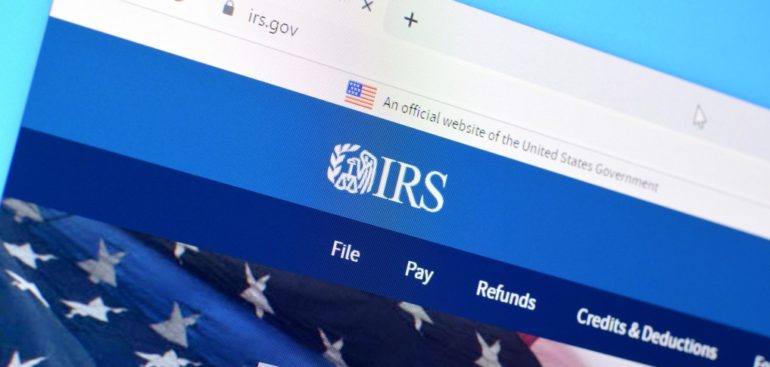Do you owe the IRS back taxes? If so, and you’re unable to pay the debt, you could be in danger of a tax levy. This means losing much more than money.
The government has the power to claim whatever’s needed when settling tax debt. This means utilizing a tax levy to reconcile unpaid taxes. Any property you own can be levied, starting with a hold called a tax lien. Money, property, and many other things can be taken by the government, and it can get serious. It can also become hard to settle the debt and clear a tax levy.
What is a Tax Levy?
Basically, a tax levy is used to collect a tax debt by seizing your property or the contents of your bank account by utilizing a lien. A tax levy and lien are two different things. While a lien only secures the property as an option for collection, the levy takes the property to satisfy the money that’s owed to the IRS. It’s a completed process that’s easier to avoid than fix.
Requirements of the IRS before a Tax Levy
There are 4 requirements that usually must be met by the Internal Revenue Service before a levy can go into effect. These requirements ensure the taxpayer has a fair chance at paying off the debt without further consequences. After all, everyone deserves an early warning that they’re in debt territory. Here’s what the IRS must do before implementing a tax levy.
- A tax bill is sent to the taxpayer. This bill includes a notice and demand for payment of the debt.
- After the bill is received, the individual or organization has a choice: Either pay the debt or refuse/neglect the payment request, basically avoiding the responsibility in many causes.
- When the payment is refused in any way, this triggers the next step or requirement of the IRS. The Internal Revenue Service sends a Final Notice of Intent to Levy and a Notice to Your Rights to a Hearing. This notice gives you 30 days to decide or amends before the levy starts. There are several ways you may receive this final notice. It may come by registered or certified mail to your last known location address. It can also be delivered to your job or handed to you personally. This depends on the circumstances. However, the IRS may levy your tax refund regardless, and you can request a hearing after the tax levy on this refund.
- The IRS contacts a third party concerning the collection of a debt. You will receive notice of this third-party contact from the beginning. This is used to help the government determine your tax liability.
How a Tax Levy Affects You
If you’re, unfortunately, hit with a tax levy, you can expect serious consequences that can affect you and your loved ones. Once things pass a threshold, you’ll start losing possessions that are worth more than just money. This can include your home and automobile.
The first hard hit comes from wage garnishment. If you’ve never gone through this process before, you’re in for a big surprise. And it will not be a pleasant one either. While many people do experience wage garnishments, they’re usually not tax garnishments. Many times, old student loan debts or child support debts are garnished from wages and have a limit as to how much they can pull.
With the government, this limit is completely different. If your wages are garnished for back taxes, you can lose more than half your paycheck to satisfy the government.
The IRS can also contact your bank and place a 21-day hold (lien) on your money, all of it. If this happens, they can levy the money from your bank to retain the tax debt that’s owed to them. This could mean all the money in your bank. There is no threshold in this case. However, they won’t take what’s in your bank account if you work out a better plan with the government.
As a last resort, the government can seize your property, including your home and automobile. Although they do not like doing this, it may be necessary to fix the situation. Other property or payments can also be taken by the IRS to settle a debt.
Tax Levy Immunities
But some payments are generally immune from this seizure. Although the IRS can sometimes seem harsh, they are lenient when it comes to economic support funds. The following payments are immune:
- any unemployment benefits
- annuities
- disability payments
- household items, mainly large furniture items
- personal valuable small items like jewelry
- child support payments
- assistance payments from the public
- pension benefits
- work or school items necessary to function properly
How to Avoid a Tax Levy
One of the easiest ways to avoid a tax levy is to make sure enough money is being withheld from your paycheck. Not doing this properly can cause you to get behind on your taxes. Creating a tax debt is how it starts, so making sure everything is up to date avoids ever getting involved with a tax levying situation.
How to Stop a Tax Levy
As soon as you realize you’re in danger of a tax levy, it’s smart to try and remedy the situation before it gets worse, and it can get quite bad. Taking care of this problem early lowers the chances of losing even more money or property. There are steps to stopping a tax levy, and you should take advantage of these options.
First, try your best to pay your back taxes when you’re facing a lien on your assets. The IRS is willing to communicate with you to solve this issue quickly. If they ask for any information, be ready to provide everything they need. Most importantly, cooperation with the IRS shows they can trust you to remedy the debt through collection actions.
Working with the IRS to Settle a Tax Levy
There is a way to possibly get the lien taken off your record. If you’re willing to use an IRS payment plan, you must make 3 successive payments from your bank account. This is called a direct debit installment agreement. You can set up this installment plan on the IRS website since there is no need for any professional help. But there is usually a fee of up to $225 associated with the installment plan depending on how much you make in wages and the amount you owe.
There’s always a possibility that you can compromise with the IRS via an Offer in Compromise and the government may be willing to take a lesser amount than what you owe. Unfortunately, the government usually only approves less than half of these applications for reduced debt. You will not be considered if you’re filing bankruptcy or if you’re being audited. To be considered, make sure all your tax returns are filed and current taxes paid.
How to Fight an IRS Tax Levy
You can always ask for an appeal and due process hearing from the IRS if you think there’s been a mistake. If you disagree with government employees on a decision for a tax levy, you can speak with the IRS employee’s manager. The office of appeals can review your case if you still don’t agree with the manager’s decision. Although it’s not that common, you can win the case with proof that the debt was indeed paid.
While it’s almost always the last resort, you can file bankruptcy to try and settle your tax debts. I say try because this doesn’t always work, and it takes quite a bit of time and paperwork to complete. Also, a lawyer usually takes care of bankruptcy proceedings, and this costs even more money.
How to Request a Tax Levy Release
Once a tax levy has begun, it may be worse than you thought. You may wonder if a tax levy release is possible. The good news is, there is a possibility that you can get the levy released.
One way to request a tax levy release is to prove that the levy is causing you an economic hardship.
Here are other ways you could possibly have the tax levy released:
- Your property may be worth much more than the amount requested by the government.
- You agreed to a government installment plan that doesn’t include the tax levy
- You’ve paid the owed amount
- It would be easier to pay taxes with the levy released
- When the levy was issued, the collection period already ended
Even with the levy released, if you still owe taxes, you’re required to continue paying what you owe to the government. If you continue to communicate with the IRS and properly pay on your installment plan, this will keep the government from putting a lien back on your property or bank account.
Once money leaves your bank account, going to the IRS for tax payments, it’s extremely hard to retrieve those funds. This is true even if an installment plan was the agreement.
Your Best Options
Obviously, it’s best to avoid a tax levy. But should you find yourself engrossed in this process, a tax expert at Innovative Tax Relief can guide you with the next steps you should take. Just request a free tax consultation from us.
In the future, always make sure your taxes are paid to the government because the IRS will eventually come knocking if you don’t.


